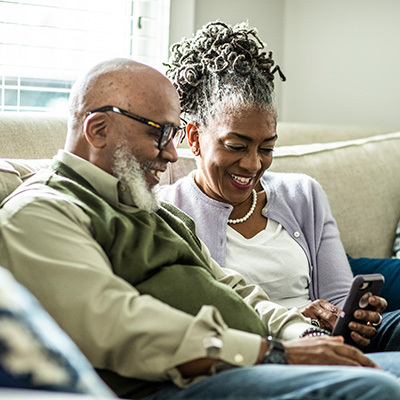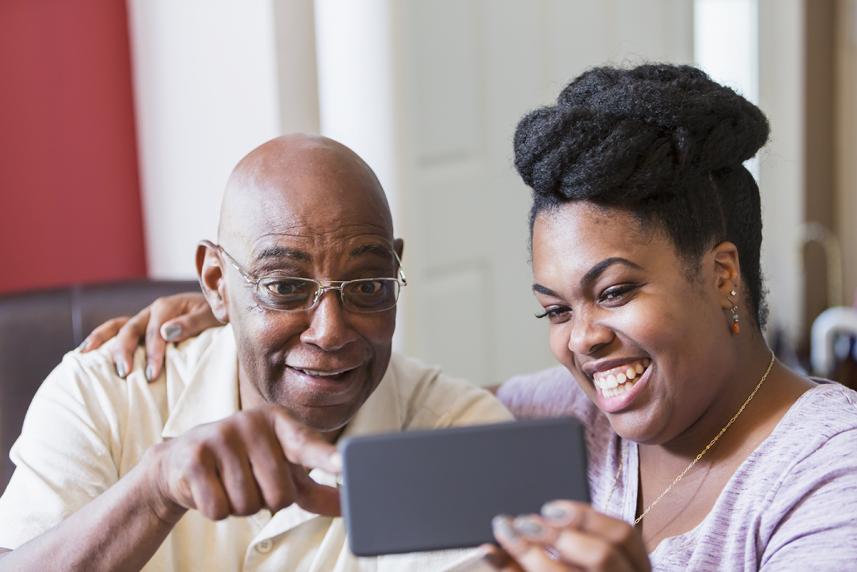
Find out if you qualify for an Aetna® Dual Eligible Special Needs Plan — we’re ready to help.
Ease stress in the moment with these free tools and apps that are already on your smartphone — no downloading needed.

Smartphones have a bad reputation for causing more stress and anxiety, not less. But your smartphone also has the potential to help you feel calmer in the moment. You just need to know what to look for and how to use it the right way.
“There are a lot of advantages to smartphones. Most of the time you can use apps and functions that are already on it,” explains John Hunter, PhD. He’s an assistant professor of psychology at the Crean College of Health and Behavioral Sciences at Chapman University in Orange, CA.
In fact, a study done by Hunter found that your phone can work like a digital security blanket during stressful moments.* “We found that when people were in awkward social situations, having their phones with them provided comfort and made them feel less alone and less stressed,” he says.
Ready to learn how to use your smartphone to reduce stress? Here are seven expert-approved ways to turn your phone into a pocket-sized stress reliever.

Find out if you qualify for an Aetna® Dual Eligible Special Needs Plan — we’re ready to help.
If you’re constantly getting pinged when you get an email, a Facebook “like” or a breaking news alert, it’s time to dial it down a notch. “When you’re constantly connected, it can lead to anxiety,” says Hunter.
Another reason to create a little separation: The more often you’re on social media, the more likely you are to feel anxious and depressed.* The study authors offered a few explanations for this.
For one, multitasking — in this case, switching back and forth between platforms like Facebook, YouTube and Twitter — has links to poor mental health. Plus, the more you engage with social media, the easier it is to make social mistakes. That can lead to embarrassment. Instead, try using social media in moderation, along with some of the other tips below.
If you can’t see family or friends in person, a shared photo album is a great way to stay connected.
Here’s how to do it on an iPhone® device:
Open your Photos app, click Albums, then My Albums.
Tap the + add button in the top left corner.
Tap New Shared Album.
Give the shared album a name, then tap Next.
Choose people to invite from your contacts, or type in an email address or iMessage® software phone number.
Here’s how to do it on an Android™ platform:
Open your Google Photos™ app.
Sign into your Google Account.
At the bottom, tap Photos.
Select photos or videos for the album.
At the top, tap +.
Tap Shared Album and enter an album title.
When you’re happy with the album, tap Share.
Select whom to share your album with.
Each person you add to your shared album will also be able to upload their own photos. Now everyone in the group can see the photos and keep up to date on what loved ones are doing. They can also follow up with supportive notes.
You can go on your web browser and search for videos that mimic nature. “Anything like the sound of wind blowing, a brook babbling or waves crashing. These all work to activate your parasympathetic nervous system, which slows your body’s stress response,” explains Hunter.
That’s especially important if it’s hard for you to leave your house or get to an outdoor area like a park or beach. Research shows that just watching these types of nature scenes on TV can make you feel happier.*
If you’ve never tried meditation, it’s easier and more relaxing than you might think. You don’t even need a special app to try some basic meditation. Simply set a timer on your smartphone for three to five minutes and do some simple deep breathing, says Bruce Rabin, MD, PhD. Dr. Rabin is a professor emeritus of preventative medicine at the University of Pittsburgh.
Try this exercise, which is known as belly breathing:
Sit in a comfy position.
Put one hand on your belly, below your ribs, and your other hand on your chest.
Inhale deeply through your nose, letting your belly push your hand out.
Breathe out through pursed lips, as if you were about to whistle. Feel the hand on your belly lowering back down.
Repeat until the timer goes off.
It can be a minute-long pep talk that points out your strengths and encourages you, suggests Dr. Rabin. You can also try a positive affirmation. One of Dr. Rabin’s favorites is a quote from Mr. Rogers:
“If you could only sense how important you are to the lives of those you meet, how important you can be to the people you may never even dream of. There is something of yourself that you leave at every meeting with another person.”
Then, listen to the message any time you’re feeling stressed or down. Or if you just need a quick pick-me-up.
The brightness of your phone can also impact your sleep quality, says Hunter. You can try putting your phone in dark or night mode to see if that helps you feel more relaxed. It’s especially important to do this several hours before bedtime, since bright light from your phone gives off blue light, explains Hunter. That can suppress melatonin, a hormone that makes you feel sleepy.
A phone is a phone, after all. “You use it to connect with other people. And we know social connections ease stress,” says Dr. Rabin. Try a video chat app like FaceTime® calling. It lets you see the other person and their expressions. That’s very important for maintaining rapport, Dr. Rabin notes.
But even if you can’t do a video call, a regular call has benefits too.* A survey conducted by the company weBoost found that talking on the phone instead of texting increased calmness and peacefulness. It also lowered stress and anxiety.
*FOR RESEARCH ON PHONE AND STRESS RELIEF SOURCE: Hunter JF, Hooker ED, Rohleder N, et al. The use of smartphones as a digital security blanket: the influence of phone use and availability on psychological and physiological responses to social exclusion. Psychosomatic Medicine. May 2018, 80(4): 345-352.
*FOR SOCIAL MEDIA AND STRESS SOURCE: Karim F, Oyewande AA, Abdalla LF et al. Social media use and its connection to mental health: a systematic review. Cureus. June 12, 2020, 12(6): e8627.
*FOR NATURE SCENES ON TV SOURCE: Yeo NL, White MP, Alcock I, et al. What is the best way of delivering virtual nature for improving mood? An experimental comparison of high definition TV, 360° video, and computer generated virtual reality. Journal of Environmental Psychology. December 2020, 72: 101500.
*FOR TALKING ON PHONE SOURCE: weBoost. Talking on the phone is a good call: full biometric study report findings. April 28, 2020.
Aetna Medicare is a HMO, PPO plan with a Medicare contract. Our DSNPs also have contracts with state Medicaid programs. Enrollment in our plans depends on contract renewal.
See Evidence of Coverage for a complete description of plan benefits, exclusions, limitations and conditions of coverage.
Plan features and availability may vary by service area.
Participating health care providers are independent contractors and are neither agents nor employees of Aetna. The availability of any particular provider cannot be guaranteed, and provider network composition is subject to change.
Eligibility for the Model Benefit or Reward and Incentive (RI) Programs under the Value-Based Insurance Design (VBID) Model is not assured and will be determined by Aetna after enrollment, based on relevant criteria (e.g., clinical diagnoses, eligibility criteria, participation in a disease state management program).
For mail-order, you can get prescription drugs shipped to your home through the network mail-order delivery program. Typically, mail-order drugs arrive within 14 days. You can call the phone number on your member ID card if you do not receive your mail-order drugs within this timeframe. Members may have the option to sign-up for automated mail-order delivery.
To send a complaint to Aetna, call the plan or the number on your member ID card. To send a complaint to Medicare, call 1-800-MEDICARE (TTY users should call 1-877-486-2048), 24 hours a day/7 days a week. If your complaint involves a broker or agent, be sure to include the name of the person when filing your grievance.
For accommodation of persons with special needs at meetings, call 1-833-278-3924 (TTY: 711).
The benefits mentioned are part of special supplemental program for the chronically ill. Eligibility is determined by whether you have a chronic condition associated with this benefit. Standards may vary for each benefit. Conditions include Hypertension, Hyperlipidemia, Diabetes, Cardiovascular Disorders, Cancer. Other eligible conditions may apply. Contact us to confirm your eligibility for these benefits.
Nondiscrimination Notice | CA-Specific Nondiscrimination Notice
©2025 Aetna Inc.
Y0001_3938460_2025_M
3957033-02-01
Call us at 1-844-514-8290 (TTY: 711) between 8 AM and 8 PM, Monday to Friday. Or visit AetnaMedicare.com/YourDSNP anytime.